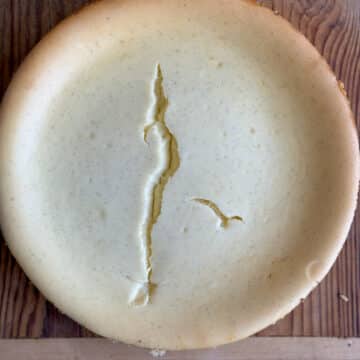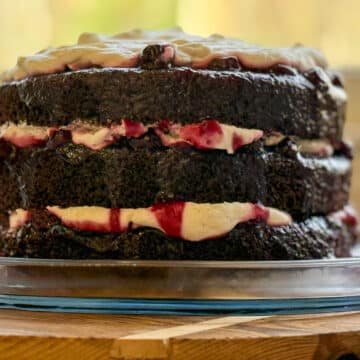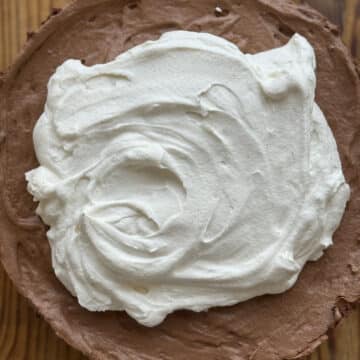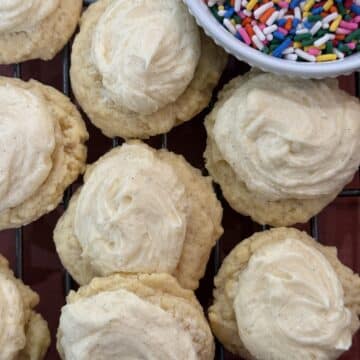This homemade pecan pie recipe creates two rich, silky, caramel flavored pies with perfectly toasted pecans and a custard center that never turns grainy. It is designed for home bakers who want steady, dependable guidance and a pie that delivers balanced flavor without extra fuss. If you love homemade baking that feels cozy, nostalgic, and deeply rooted in family tradition, this is the pecan pie recipe you can return to every Thanksgiving and Christmas. Prep Time: 15 minutes | Bake Time: 50 to 55 minutes | Total Time: About 1 hour 10 minutes | Yield: 2 pies
Key Takeaways
- This pecan pie recipe yields two rich, caramel-flavored pies with a smooth custard center and perfectly toasted pecans.
- The recipe combines light and dark corn syrup for balanced flavor, making it a favorite for holiday gatherings.
- It's simple enough for beginners but reliable for seasoned bakers, adapting well to busy holiday kitchens.
- Key ingredients include eggs for structure, corn syrups for flavor, and large chopped pecans for perfect texture.
- Serve this classic pecan pie at room temperature or slightly chilled, and it can be made ahead for better flavor.

A Holiday Pie That Brings Everyone Together
Every year right before Thanksgiving, our family (girls) gathers for what pie day. If you walked into our house during those hours, you would hear laughter first. Then the steady rhythm of mixing bowls being pulled from cabinets. Someone rolls out dough while my daughter reaches for the cinnamon. A niece sneaks extra pecans into her palm. Flour floats into the air and settles on every surface. It is loud, messy, joyful, and full of the kind of memories that last a lifetime.
We usually make at least six pies. The table fills quickly with pumpkin, apple, sometimes chocolate, and always pecan. Pecan pie has earned its permanent place in this lineup. Its aroma alone feels like Thanksgiving. The caramel notes from the dark syrup deepen as the pies bake. The pecans toast gently on top. The whole house smells warm and inviting.
Part of why this recipe has stayed with us over the years is the balance of flavors. Many pecan pie recipes lean heavily on one type of corn syrup. All light corn syrup makes the filling sugary without much depth. All dark corn syrup creates a strong molasses tone that can overshadow the pecans. We started blending both because it created the flavor we genuinely loved. Light syrup keeps the sweetness smooth and clean. Dark syrup adds warmth and caramel richness. Together they produce a balanced pecan pie that tastes like tradition. Personally, I think this is much better than your typical southern pecan pie recipe or even grandma's old fashion pecan pie.
You will see references to the recipe card below, which gives exact measurements and steps. This article will help you understand not just how to make pecan pie but why each step matters. I'm a firm believer that when you understand the science behind baking, you are much more relaxed and able to enjoy the moment whether you are baking alone or surrounded by kids, siblings, or church friends. I know I am.
As you plan your Thanksgiving or Christmas menu, this pecan pie pairs beautifully with our Cinnamon Rolls with Heavy Cream, our warmly spiced Apple Cider Donuts, or anything from our full Holiday Recipes collection. These flavors complement one another and create a cozy, welcoming table that feels like home.
Jump to:
- Key Takeaways
- A Holiday Pie That Brings Everyone Together
- Why You'll Love This Pecan Pie
- Ingredients You Need and Why They Matter
- How to Make This Pecan Pie
- Tips, Tools, and Troubleshooting
- Variations, Substitutions, and Storage
- Recipe FAQs
- Recipe
- Homemade Pecan Pie with Both Light & Dark Corn Syrup
- What to Bake Next
- If You Loved This, Try These!
- Comments
Why You'll Love This Pecan Pie
When readers tell us this pecan pie is their new go to recipe, the reasons are consistent. This pie is dependable. It's forgiving; it's rich without being too sweet. And it slices beautifully. And most of all, it tastes like a true homemade pecan pie.
Here are the qualities that set it apart for home bakers.
- The custard center is silky and smooth with no graininess.
- Using both light and dark corn syrup creates balanced caramel flavor.
- Large chopped pecans rise naturally to the top for perfect texture.
- The filling comes together in one large bowl with gentle stirring.
- This recipe bakes two pies which is perfect for gatherings or gifting.
- This is a true southern pecan pie that feels warm and familiar.
- Every bite feels nostalgic, cozy, and perfect for the holidays.
This recipe is also wonderful for children or young bakers because the mixing process is simple and accessible. It is perfect for church events, neighborhood gatherings, or Thanksgiving tables where everyone brings a dish. A pie that tastes like home blesses everyone who shares it.
Ingredients You Need and Why They Matter
Most pecan pies use simple pantry ingredients, but the way those ingredients work together is what creates a truly great texture. Understanding the science behind each item gives you confidence, helps with troubleshooting, and ensures consistent results. Your recipe card below includes measurements. These notes explain the technique.
Eggs
Eggs form the structure of the custard. When they heat, their proteins unfold and bond which causes the filling to thicken. This transformation is called coagulation. It is the foundation of custard based pies. The heat must be controlled. If the filling heats too quickly, the proteins tighten aggressively which causes curdling. If the filling does not heat enough, the center stays runny. Sugar raises the temperature at which eggs set which gives you a smoother, gentler custard.
Light corn syrup
Light corn syrup adds sweetness and prevents sugar crystallization. It stabilizes the custard and ensures a smooth, glossy finish. On its own, it can make the pie overly sweet which is why this recipe blends it with dark syrup.
Dark corn syrup
Dark corn syrup contains molasses. That molasses adds color, warmth, and caramel depth. It takes the sweetness of the light syrup and makes it taste more layered and rich. On its own, it can create a strong flavor. This is why we blend.
Why this recipe uses both syrups
Most pecan pies rely on one syrup or the other. But we tested many combinations over the years and found that blending both gives the perfect balance. All light syrup creates a sugary filling. All dark syrup tastes too much like molasses. Using both produces a custard that is flavorful, warm, and deeply caramel without overpowering the pecans. This is one of the main reasons readers love this recipe.
Sugar
Sugar supports the custard by helping eggs thicken evenly. It increases the temperature at which the custard sets which protects the texture. Sugar also enhances caramel flavor and gives the top a beautiful golden color.
Melted butter
Butter adds richness and helps the custard remain tender. The fat coats proteins in the eggs which slows down tightening. Without butter, the custard can taste flat and firm. With butter, the filling becomes silky and smooth.
Vanilla extract
Vanilla adds warmth and gentle sweetness. It enhances the nutty flavor of the pecans and rounds out the caramel notes from the syrup. It is subtle but important.
Pecans
Use large chopped pecans rather than whole halves or finely chopped pieces. Whole pecans make slicing messy and heavy. Fine pieces create a dense filling. A large chop allows the pecans to rise naturally as the custard heats. They float to the surface where they toast and caramelize which gives the pie its signature look and flavor.
Unbaked pie crusts
Start with unbaked pie crust. The custard begins fully liquid which means the crust must bake with the filling. Prebaked crusts can overbrown by the time the custard sets. A great pumpkin pie starts with a great crust. For this recipe, I always use The Best Easy Pie Crust Recipe (Flaky & Foolproof); the same one my mom taught me to make years ago. Simple ingredients, smart technique, and a dough that's as tender as the memories tied to it. Trust me, the pie crust matters!

How to Make This Pecan Pie
One of the best parts of this recipe is that it is simple enough for beginners but reliable enough for seasoned bakers. Holiday kitchens are busy and full, and this recipe adapts gracefully to that environment.
High level steps
- Preheat your oven to 350 degrees so the custard sets evenly.
- Gently mix the eggs, light corn syrup, dark corn syrup, sugar, melted butter, and vanilla.
- Fold in the large chopped pecans.
- Pour into two unbaked 9 inch pie shells and place both pies on a rimmed baking sheet.
- Bake for 50 to 55 minutes or until a knife inserted in the center comes out clean.
- Cool completely so the custard can finish setting.
More guidance to help you bake with confidence
- Stir gently. Whipping introduces air which causes cracks.
- Use room temperature eggs. Cold eggs firm the butter.
- Pecans will rise naturally as the custard thickens from the bottom up.
- A rimmed sheet pan stabilizes both pies.
- Begin checking at the 45 minute mark because ovens vary.
- Use the knife test. It is more reliable than visual cues alone.
- Cool fully. This is essential for the custard to firm properly.
As you continue baking this recipe over time, these steps will become second nature. Pecan pie is one of those classic treats that becomes easier each time you make it.
Tips, Tools, and Troubleshooting
Let me help you with some of the technique, science, and practical experience I've learned over the years, so you too can have the confidence to troubleshoot and master pecan pie baking. These notes reflect years of family baking and dozens of pies baked during Thanksgiving and Christmas seasons.
Tips and techniques
- Stir slowly to avoid incorporating air.
- Use large chopped pecans for even rise and toasting.
- Place pies on a rimmed baking sheet to prevent spills.
- Bake on the middle rack for even heat distribution.
- Let pies cool completely before slicing or storing.
- Check for doneness with a knife. The center should not be wiggly.
- Home ovens often run warmer or cooler than the display. An oven thermometer helps ensure accurate baking temperature for consistent results.
Tools I recommend
- Stand mixer (KitchenAid) for effortless mixing when baking multiple pies. (I recommend any of the KitchenAid mixers!)
- Hand mixer if you do not have a stand mixer.
- Silicone spatula for gentle folding.
- Large mixing bowl for stirring without splashing.
- Rimmed baking sheet to stabilize the pies. (Setting the pies on a sheet pan makes it easier to transfer to and from the oven without tipping. It also catches any drips if the filling bubbles.)
- Glass or metal pie plates for even heat transfer.
Troubleshooting
Understanding the science behind pecan pie helps you fix issues and prevent them in the future. Here are the most common problems and how to correct them.
Pie is runny after cooling
A runny center means the custard did not reach the temperature needed for egg proteins to set. Continue baking until the pie passes the knife test. Always cool completely before slicing.
Crust is browning too quickly
If your crust darkens before the filling finishes baking, loosely tent with foil. This slows the Maillard reaction which is the chemical process that creates golden color and toasted flavor when heat interacts with sugars and proteins. Tenting allows the center to finish baking without burning the crust.
Filling puffed up high
This indicates the oven was too hot. Air bubbles expand rapidly and the custard puffs. Use an oven thermometer to verify temperature accuracy.
Pecans sank instead of rising
Sinking pecans usually mean the mixture was overmixed or the nuts were too finely chopped. Use large chopped pecans and fold gently.
Top cracked during baking
Cracks form when too much air gets into the filling or when the pie is overbaked. Stir gently and remove the pie as soon as the knife test shows doneness.
Filling looks grainy or curdled
This means the eggs cooked too quickly. A steady 350 degree oven prevents this. Bake on the middle rack for consistent heat.
Pie is overly firm or rubbery
This happens when the custard overbakes and proteins tighten too much. Trust the knife test rather than the timer.
Edges of the pie sink or caves appear
Rapid cooling can cause the custard to contract. Always cool pies at room temperature and avoid refrigeration until fully cooled.
Variations, Substitutions, and Storage
Pecan pie is wonderfully adaptable. These ideas help you customize the flavor while maintaining a stable custard.
Variations and substitutions
- Chocolate pecan pie
Scatter chocolate chips over the crust before pouring the filling. - Maple pecan pie
Replace two tablespoons of light syrup with pure maple syrup for added warmth. - Nut blend variation
Combine walnuts and pecans for a rustic flavor. - Gluten free option
Use a gluten free crust. The filling is naturally gluten free.
Serving and storage
- Serve at room temperature or slightly chilled.
- Store at room temperature for two days or refrigerate for up to five.
- Freeze fully cooled pies for up to two months.
- Thaw in the refrigerator before serving.

Recipe FAQs
Insert a knife into the center. If it comes out clean, the pie is ready. The edges should be set and the center soft but not liquid. Cooling completes the setting process.
Yes. Pecan pie tastes better the next day because the flavors settle beautifully. Bake the day before Thanksgiving for the best results.
Using both creates balanced flavor. Light syrup brings sweetness. Dark syrup adds caramel richness. Together they create the perfect pecan pie filling.
Yes. The filling mixes in one bowl with gentle stirring. The recipe card guides you through each step. As long as you cool fully and use the knife test, this is a very beginner friendly recipe.
Too much air in the filling or overbaking creates cracks. Stir gently and remove the pie as soon as it passes the knife test.
Absolutely you can. A good quality unbaked crust works beautifully, and store bought can be much easier. However, I would always recommend homemade crusts. And my Pie Curst is Flaky and Foolproof, and I would recommend it over any store bought crust.
Both! Light syrup keeps the sweetness smooth and prevents sugar crystals from forming. Dark syrup brings caramel depth from its molasses content. Using both balances flavor so the pie is not overly sweet or heavy.
Recipe

Homemade Pecan Pie with Both Light & Dark Corn Syrup
Equipment
- 1 large mixing bowl
- 1 silicone spatula
- 1 stand mixer or hand mixer
- 1 whisk
- Measuring Cups and Spoons
- 2 Rimmed Baking Sheet
- 2 9 inch Pie Plates
- 2 Cooling racks
Ingredients
- 6 eggs slightly beaten
- 1 cup light corn syrup (Karo)
- 1 cup dark corn syrup (Karo)
- 2 cups sugar
- 4 tablespoons ½ stick butter, melted, salted I always use salted butter to bring out the butter flavor
- 2 teaspoons vanilla extract
- 2 ½ cups pecans
- 2 unbaked 9-inch pie crusts Homemade is always best. See The Best Easy Pie Crust Recipe Flaky & Foolproof, but store-bought works too if you're short on time.
Instructions
- Preheat oven to 350 degrees. Make sure your oven rack is in the center position for even heating.
- In a large mixing bowl, combine the eggs, light corn syrup, dark corn syrup, sugar, melted butter, and vanilla. Stir gently until the mixture is well blended. Avoid whipping or beating, since too much air can create cracks in the finished pie.6 eggs, 1 cup light corn syrup, 1 cup dark corn syrup, 2 cups sugar, 4 tablespoons ½ stick butter, melted, salted, 2 teaspoons vanilla extract
- Add the pecans and mix evenly. Use large chopped pecans so they rise naturally to the top as the custard thickens during baking.2 ½ cups pecans
- Pour the mixture into two unbaked 9 inch pie shells. Place both pies on a rimmed baking sheet to stabilize them and catch any potential spills.2 unbaked 9-inch pie crusts
- Bake for 50 to 55 minutes, or until a knife inserted in the center comes out clean. The center should look set with a soft, even surface. Begin checking at the 45 minute mark since ovens can vary.
- Cool completely before serving. Cooling allows the custard to finish setting so the slices hold together and the texture becomes silky and smooth.
Notes
- Why this pie uses both light and dark corn syrup: Light syrup keeps the sweetness smooth and prevents sugar crystals from forming. Dark syrup brings caramel depth from its molasses content. Using both balances flavor so the pie is not overly sweet or heavy.
- How the custard sets: The custard thickens as egg proteins slowly unfold and bond when heated. Sugar raises the temperature at which this happens which prevents curdling and helps the filling stay silky instead of grainy.
- Why gentle stirring matters: Whipping the filling adds extra air. Those air pockets expand in the oven which can cause cracking or uneven rise. Gentle stirring keeps the custard smooth and stable.
- Using large chopped pecans: Pecans naturally rise as the custard thickens from the bottom up. Large chopped pieces float evenly and toast perfectly on top. Whole halves can sink or create slices that fall apart, and finely chopped nuts create a dense filling.
- How to know the pie is done: The knife test is the most reliable method for custards. Insert a knife into the center. If it comes out clean, the eggs have set. The center should look soft but not liquid.
- Preventing overbaking: Overbaking makes custards firm or rubbery because the egg proteins tighten too much. Begin checking at the 45 minute mark. Pull the pie as soon as it passes the knife test.
- Cooling is part of the baking process: As the pie cools, the custard finishes thickening. Cutting too early can make the pie look runny even if it is baked correctly. Always cool fully before slicing.
- Why a rimmed baking sheet helps: Setting the pies on a sheet pan makes it easier to transfer to and from the oven without tipping. It also catches any drips if the filling bubbles.
- Consistency across ovens: Home ovens often run warmer or cooler than the display. An oven thermometer helps ensure accurate baking temperature for consistent results.
- Make ahead tip: Pecan pie tastes even better the next day because the flavors settle and the custard finishes firming. Bake the day before serving for the best texture.
Nutrition
What to Bake Next
If you are already planning your holiday menu or you just love baking something sweet after pulling a pecan pie from the oven, here are a few tried and true recipes from The Baker's Table that our readers return to again and again. These are real staples from our kitchen, and they beautifully round out any Thanksgiving or Christmas table.
If you love warm, cozy, from-scratch treats, try our Homemade Cinnamon Rolls with Heavy Cream. They rise tender and pillowy thanks to a warm pour of cream before baking, and our readers always tell us they make Christmas morning feel extra special. You can find them here on the blog.
If you want something chocolatey to contrast the caramel notes of this pie, our Fudgy Gluten-Free Chocolate Cake is incredibly rich and smooth with a texture similar to a truffle. It is a favorite among gluten free readers and anyone who loves a deeply chocolate-forward dessert.
No matter what you bake next, I would truly love to see it. Share your photos or leave a review with us on Instagram or Facebook. Your comments help other home bakers feel confident, and they help our small baking community grow with warmth and encouragement.
Real ingredients. Real connection. Really good baking.
About Kendra Boettner
Hi, I'm Kendra, wife, mom of three, and the baker behind The Baker's Table. After 20+ years baking at home, including time working in professional kitchens, these are some of my favorite recipes I've learned along the way.
🧁 Want to see more? Join me on Instagram, Facebook, and Pinterest
1️⃣ My 'The Best No Bake Oatmeal Cookie" was my #1 recipe in 2025! Easy and kid friendly!
📋 Here are Kendra's favorite recipes
🍪 Or start with some of our readers' favorites:
- The Best Easy Pie Crust Recipe (Flaky and Foolproof)
- The Best Homemade Brownies (Chewy, Fudgy!)
- Lemon Meringue Bars with Swiss Meringue
- Cake Pucks Made Easy (Cake Pops without the Sticks)
- No-Bake Chocolate Mousse Pie with Oreo Crust
📋 Browse all of my recipes
🔗 The Baker's Table is Featured in:
🔗 Visit the About Me page to learn more about Kendra, Eric, and The Baker's Table!





Comments
No Comments